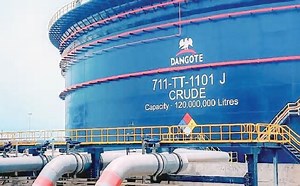
The Nigerian Ministry of Labour has intervened in the industrial dispute between the Dangote Refinery staff and the Petroleum and Gas Senior Workers Association of Nigerian, Pengassan.
Over 800 senior workers of Dangote refinery who joined the oil and Gas union were sacked by the management under a restructuring exercise.
Ahead of the meeting , Nigerian government appealed to oil workers not to go on strike.
In retaliation, the oil and gas union under the auspices of Pengassan called on its members to go on strike from Monday, shut down oil and gas production to the Dangote Refinery.
Meanwhile, Dangote Refinery said the company respect workers’ rights, restructuring the organisation exercise and retain 3,000 workers Nigerians.
The management insists that dismissed workers were saboteurs who cannot meet the safety protocols of the company now.
According to the organisation, Dangote refinery is laying the foundation for sustainable operations that will serve Nigerians for generations
Assurances

The Dangote Petroleum Refinery reassured Nigerians that its ongoing reorganisation is a carefully considered step to strengthen safety, integrity, and long-term sustainability of the $20 billion facility.
This is the Africa’s largest single-train refinery and one of the most ambitious industrial projects on the continent.
In a statement press, the Management of the Refinery clarified that the restructuring was not arbitrary, but a necessary response to repeated acts of sabotage in various operational units of the refinery.
These incidents, the company said, created serious safety risks, disrupted operational efficiency, and underscored the need to fortify internal processes.
Denying False claims

Dangote denied false claims by PENGASSAN on recruitment of foreign workers to replaced Nigerians .
Despite reports of job losses, through restructuring, the company disclosed that more than 3,000 Nigerians remain actively employed at the refinery, while only a small number of staff were affected by the exercise.
Recruitment is ongoing through graduate trainee programmes and experienced-hire placements, with management insisting that Nigerian talent remains at the core of its operations.
The refinery described the measure as a consolidation process designed to strengthen efficiency rather than a downsizing effort.
“We will continue to provide decent, sustainable jobs while building capacity for the future,” it said.
Strong Commitment to Workers’ Rights

Responding to concerns about labour relations, Dangote Petroleum Refinery reiterated its respect for internationally recognised labour principles.
It reaffirmed that all employees retain the right to freely decide whether or not to join a union, and that workers’ rights remain protected.
“Our commitment to workers’ rights is unwavering. We recognise that the refinery’s success is tied to the wellbeing of our people, and we will continue to operate with fairness and transparency,” the company emphasised.
Transforming Nigeria Refinery Hub
The 650,000 barrels-per-day refinery, officially commissioned in 2023, was conceived to end Nigeria’s decades-long dependence on imported refined petroleum products.
The facility is expected to save the country billions of dollars in foreign exchange annually, stabilise domestic fuel supply, and transform Nigeria into a regional refining hub.
Industry experts see the refinery as a game-changer for Africa’s energy security, with potential to export refined products across West and Central Africa, reduce import bills, and create jobs across multiple value chains.
In addition to direct employment, the refinery has spurred growth in support services, logistics, and supply chains, indirectly benefiting thousands of households.
The reorganisation, according to management, is aimed at protecting these wider socio-economic benefits from internal and external threats.
Commitment to Integrity, Transparency and Accountability
Dangote Refinery restated its commitments to integrity, transparency and accountability through good working relationship with employees, regulators and other stakeholders in the oil and gas industry.
As the refinery gradually ramps up operations, it faces intense public scrutiny and high expectations. Many Nigerians see it as a solution to chronic fuel scarcity and rising energy costs. The company has pledged to work closely with employees, regulators, and other stakeholders to maintain operational integrity, transparency, and accountability.
The Dangote Petroleum Refinery remains one of Nigeria’s most strategic industrial assets, an enterprise whose success or failure has far-reaching consequences for the Nigerian and continental economy.
Read Also : Nigeria Launches Solar Manufacturing Facility
Unlock Gulf of Guinea Potentials: Gambari
https://petroleumrefinerysales.dangote.com




